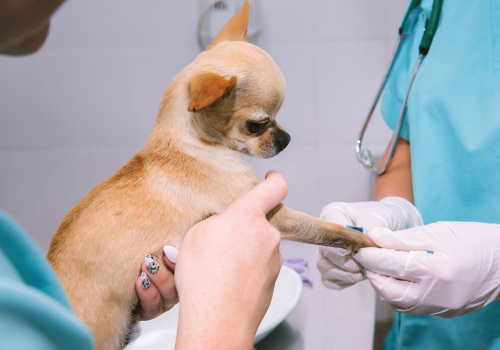If your veterinarian has recommended labwork for your dog, the options and schedule can be confusing. We don't expect you to know every detail, which is why we've taken FAQs on labwork for dogs and answered them as thoroughly as possible, in order to get you the facts you need and deserve.
Why might my dog need blood work?
Your dog may need blood work for various reasons. One obvious reason would be if the dog is sick and they come in and need lab work to find out what's wrong with them. Another reason might be if the dog will have surgery and we want to check out to make sure they're healthy enough to withstand the procedure. Illnesses in dogs, such as heartworm disease or intestinal worms, aren’t always obvious, so we do laboratory work to see if those things exist in that particular patient. We also conduct blood work on your dog during annual wellness exams, as that gives us a baseline to tell us if something is wrong at future appointments.
Why are laboratory tests so important for my dog’s health?
Dogs can't tell us when they’re not feeling well and will often attempt to hide illness, so by performing lab work, we can detect things that we may not know are going on with your pet. It’s almost like preventive care measures in that we’re trying to uncover an illness before there are any clinical signs of it. That’s what makes lab tests for dogs so critical, as we can address any underlying or obscure disease before it becomes more apparent and makes the patient more ill.
What types of lab work can be done, and how are these tests done?
There are many different types of lab work that we conduct on dogs.

Some of the routine lab work that we perform on dogs are:
- Annual heartworm and other tests for intestinal parasites
- Fecal exams
- Complete blood counts (CBCs)
- Blood chemistry panels
- Urinalysis to test for possible signs of infection
- Thyroid tests
- Testing any suspicious lumps or bumps
- Glucose tests
Most veterinary clinics offer these tests in-house, but we can also send them out for more specialized testing. The benefit of doing these tests in-house is that we get the results immediately. And if you have a sick dog, you don't want to wait 24-48 hours for the results to return. But if it’s a wellness test, we can send that out and perhaps get more value for your money by sending it out to the lab.
What do the chemistries mean in my dog's blood work?
The two chemistries that come to my mind first and foremost on every sick animal are kidneys and liver. So what are we looking at? Kidneys have specific markers that can appear on a routine chemistry panel—SDMA, BUN, creatinine, and phosphorous. That gives your veterinarian a picture of what's going on with the dog’s kidney function. The liver enzymes are also significant for chemistries we check—ALT, AST, alkaline phosphatase, and bilirubin. The liver can impact cholesterol, and albumin and globulin are two proteins produced by the liver.
The panels we run may also include electrolytes, blood glucose, pancreatic enzymes and thyroid values. We may also want to run coagulation test on an animal with impaired liver function or a pet who has potentially ingested rat or mouse poison. The liver is responsible for producing clotting factors, which is essential to preventing spontaneous bleeding.
When your pet has blood tests performed, we will ensure you receive answers to all your questions as well as any further information to take home with further explanations. Don't hesitate to ask your veterinarian to help you understand anything that might be confusing to you.

How do baseline lab tests benefit the health of my dog?
Some clients might think, "Well, my dog’s not sick. Why do I need to do blood work?" We know that a pet normally runs a certain number on specific values when we have a baseline. Then all of a sudden, when we get a value that is perhaps much higher or way lower than what that dog's “normal” was during their annual wellness exam, the baseline comes into play. It helps us to determine what might be wrong with your pet.
Why is early detection and diagnosis of dog illnesses using lab work so important?
If we catch and treat diseases early, the prognosis is nearly always better. Let's take kidneys, for example. If your dog’s kidneys begin failing for whatever reason, whether it’s from a toxin or simply old age, those failing nephrons don't come back. And a dog can tolerate those failing nephrons to a certain extent, but once they get beyond that point, it's a very slippery slope. In other words, sometimes they can be too far gone for us to be able to pull them back and improve their quality of life. Had we had that same dog during a wellness exam years before, their BUN was likely slightly elevated, and that would have indicated that the dog’s kidney function might be impaired. That is the prime time when you can put that dog on corrective diets and various supplements and do other things to slow the progression of those failing kidneys. So early detection of dog illnesses and disease is nearly always going to carry a better prognosis.
If you’re looking for a highly trained veterinarian in Crosslake, MN, we’d love to see your dog and help you to get them on a good fitness and activity regimen, so please call us right away at (218) 692-4400.

